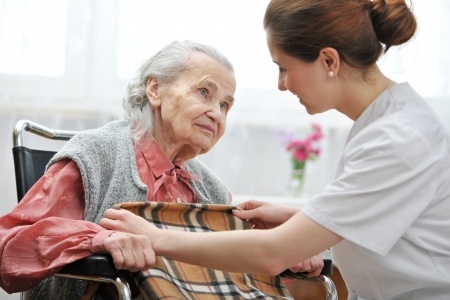Watch Out For Elder Abuse
January 10, 2014 | Category: | Share An elderly relative, neighbor or friend may appear different one day. There is a bruise on his face. He appears edgy and explains the bruise is from a fall. You may think this is just the sign of getting older. But many times it is not.
An elderly relative, neighbor or friend may appear different one day. There is a bruise on his face. He appears edgy and explains the bruise is from a fall. You may think this is just the sign of getting older. But many times it is not.
The NCEA (National Center on Elder Abuse) recommends, "When visiting, plan ahead; stay connected; know the signs of elder abuse."
NCEA reports that one in ten elder citizens in the U.S. are abused and neglected. Visit the elderly often, and not on a set schedule. When visiting access the elder person's living conditions and look for the potential of abuse. Abuse is not always noticeable. Some probing may be needed. Often this may not be an easy task, as elders may tend to be very private and ashamed of what has happened to them. However, visitors of the elderly should not be distracted from taking the responsibility of "staying connected".
Common forms of abuse may include pushing, hitting, shaking, beating, yelling, verbal harassment, coercive behavior, intimidation and any other acts which may cause harm, including financial harm. Financial harm may come in the form of unauthorized use of the elder's money, property or other valuable resources. Unfortunately, experts report that the abuser is often someone the elder knows; adult children, grandchildren, friends, neighbors, in-home health care providers, and nursing or assisted living home providers.
NCEA recommends preparing a checklist, before visiting, of things to look out for and to discuss with the elderly. Here are some of their recommendations:
-
Does the elder require help with chores or housekeeping, bathing, dressing, shopping and meal preparation, managing money, transportation or medications?
-
Is he/she isolated?
-
How often does he/she socialize with others?
-
If living with another, is he/she dependent on that person for care? Is that person an appropriate caregiver? Does the caregiver understand the medical conditions that the elder has?
-
During your visit, keep an eye out for warning signs of self-neglect, or abuse or neglect by others. Remember that most elder abusers are related to the older person.
-
If, before you visit, you suspect that your loved one needs extra assistance, plan a longer stay so that you can visit local aging service organizations, physicians and attorneys during regular work hours. Make the most of your visits by taking some private time with the elder to discuss future planning. Elders may not be aware of a gradual decline and may be reluctant or unable to plan for needed care. Support and guidance from family members can help prevent serious accidents and future health complications. Noticing and correcting problems can help keep elders safely in their homes. Allow time for them to express anxieties and needs. You can decide together what needs to be done and who can help.
-
Also, if you are visiting an elder who is not a relative and see signs of potential abuse or neglect, be sure to let a relative know your concerns.
Another good source of information on elder abuse is HelpGuide.org . On their website they cover topics such as:
-
What is elder abuse?
-
Where does elder abuse take place?
-
The different types, general signs of, and risk factors for, elder abuse - physical, emotional, sexual, caregiver neglect or abandonment, financial exploitation and health care fraud and abuse.
-
Preventing elder abuse.
The Adult Protective Services Act (Chapter 415 of Florida Law) requires specific procedures for reporting and investigating abuse, neglect and exploitation of the disabled and the elderly. Under this act, the Department of Children and Families Adult Protective Services Office is the lead agency for handling abuse reports and investigations.
"The state of Florida, Department of Elder Affairs is a network of social services and law enforcement agencies throughout the state. They protect Florida's elders from neglect and abusive situations and environments. To report elder abuse, neglect, or exploitation call the Abuse Hotline at (800) 96-ABUSE (2873)," says Lee, Collier, and Charlotte County Elder Abuse Attorney, Randall Spivey of Spivey Law Firm, Personal Injury Attorneys, P.A.
Collier County Nursing Home Abuse/Neglect Attorney, Randall L. Spivey is a Board Certified Trial Attorney – the highest recognition for competence bestowed by the Florida Bar and a distinction earned by just one (1%) percent of Florida attorneys. He has handled over 2,000 personal injury and wrongful death cases throughout Florida. For a free and confidential consultation to discuss your legal rights, contact the Spivey Law Firm, Personal Injury Attorneys, P.A., in Lee County at 239.337.7483 or toll free at 1.888.477.4839,or by email to Randall@SpiveyLaw.com. Visit SpiveyLaw.com for more information. You can contact Spivey Law Firm, Personal Injury Attorneys, P.A.in Charlotte County at 941.764.7748 and in Collier County 239.793.7748.

